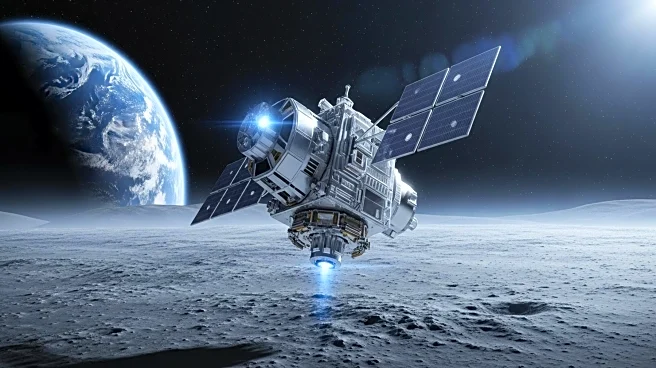What's Happening?
The European Space Agency (ESA) has signed a memorandum of understanding (MoU) with the Korea AeroSpace Administration (KASA) to enhance cooperation in space activities. This agreement, signed at the 76th International Astronautical Congress in Sydney, aims to facilitate the use of each other's ground stations for telemetry, tracking, and command functions. The MoU also covers future collaboration in areas such as space science, exploration, human spaceflight, and in-space infrastructure. Additionally, ESA is strengthening its partnership with the Japan Aerospace Exploration Agency (JAXA) through a rideshare agreement involving ESA's Ramses spacecraft and Japan's Destiny+ mission. These initiatives are part of ESA's strategy to diversify and deepen global partnerships amid uncertainties over NASA's budget and cooperative programs.
Why It's Important?
The expansion of ESA's cooperation with South Korea and Japan signifies a strategic move to bolster international collaboration in space exploration. This partnership could enhance South Korea's lunar ambitions, including the development of a robotic lunar lander and a long-term vision of establishing a moon base by 2045. The collaboration with Japan on the Ramses mission highlights the importance of shared resources and expertise in studying asteroids, which could provide critical insights into planetary defense and scientific research. These developments reflect a broader trend of international cooperation in space, which is crucial for advancing technological capabilities and achieving ambitious exploration goals.
What's Next?
ESA's collaboration with South Korea and Japan is expected to lead to further joint missions and projects, potentially involving other international partners like India. South Korea's lunar program, supported by ESA's global ground station network, is likely to progress towards its goal of launching a homegrown rocket for lunar exploration. Meanwhile, the Ramses and Destiny+ missions will proceed with their planned studies of asteroids Apophis and 3200 Phaethon, contributing valuable data to the scientific community. These partnerships may also pave the way for new agreements and initiatives in space exploration, fostering a more interconnected and cooperative global space community.
Beyond the Headlines
The deepening of ESA's partnerships with South Korea and Japan could have long-term implications for global space policy and cooperation. By sharing resources and expertise, these collaborations may lead to more efficient and cost-effective space missions, reducing the financial burden on individual countries. Additionally, the focus on peaceful purposes in space activities underscores the importance of maintaining international harmony and avoiding conflicts in outer space. As space exploration becomes increasingly collaborative, ethical considerations regarding resource sharing and technological advancements will likely become more prominent.








